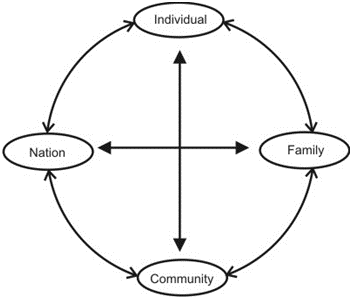Many political thinkers believe the world will be a better place only if we first change our personal value systems for the positive. Such a change will diffuse into the political process, and western democracy will get better because we will have better voters who are putting better people into influential positions. This then leads to better governance. The western democratic model need not be changed at all; enough of us need only change ourselves—the changes at the top levels of government will follow.
This won’t work. To explain, I will bring in some philosophy of aboriginal thinkers.
Their paradigm has divided a person’s psyche into four parts: the individual, the family, the community, and the nation. All four parts affect each other. If one part is strong, it strengthens the other three. If one is weak, it weakens the others. We know that people who are raised in dysfunctional families and neighborhoods tend to have more dysfunctional values than people who are raised in better nurturing environments. People raised in western democracies tend to have more opportunities and prosperity than people under other systems of government. And these western citizens are then more able to rise to their full potential. This increase in potential eventually affects how well the society is governed.
The diagram below shows how the four parts are connected. Sometimes these connections are direct and easy to see. And sometimes they are indirect and may take a decade or two to see some tangible relationships.

In general, a majority of citizens living in western democracies perceive western democracy to be more of a civilized power struggle rather than a positive social engineering tool. This perception breeds the distrust, the cynicism, apathy, and the feelings of powerlessness that western democracy obviously inculcates in its citizenry. These attitudes, even though western democracy is indeed a very powerful social engineering tool, mean that the “nation” of our aboriginal paradigm is not healthy: it has minimal influence to create better communities, families, and individuals. We could argue for a long time on the magnitude of this negative influence, but I think most readers would agree that the “nation” could be—and should be—providing better leadership.
If anything, the “nation” of western democracy has become the weakest link in the aboriginal paradigm—and is limiting how much further we can advance as a civilization. The 12 limitations of western democracy are creating this barrier.
Reforming our characters for the better is indeed a noble and worthwhile task. Life goes so much better for those individuals who successfully travel on this life journey. But even if many individuals take this journey, none of the 12 limitations of western democracy go away. Reforming characters seems a pointless task in terms of strengthening the “nation” for far too many people are not encouraged to take their life journey when the nation seems to be run by people who also need to go on that journey. If anything, the weaker rulers and the weaker subjects reinforce each other to not make their own life changes. When individuals remain weak (because that seems to be the example,) too many families and communities also remain weak. And this then feeds back into weakening the nation.
Tiered Democratic Governance (TDG) is about strengthening the nation. By being free of the 12 limitations, a “nation” under a TDG will find people of good character and capacity for governance—and put them in a forum where they can fully utilize their talents and experience. This will produce better governance for society, which then inspires communities, families, and individuals to new heights. And these new heights, a decade or two later, will cycle back up to raise the nation even higher.
The four parts of the aboriginal paradigm are always connected. If there is not a simultaneous effort to raise the nation at the same time as the individual, family, and community, then any rise in the individual, family, and community will be limited!
Published on Writerbeat 2017
The Impedance of the US Constitution